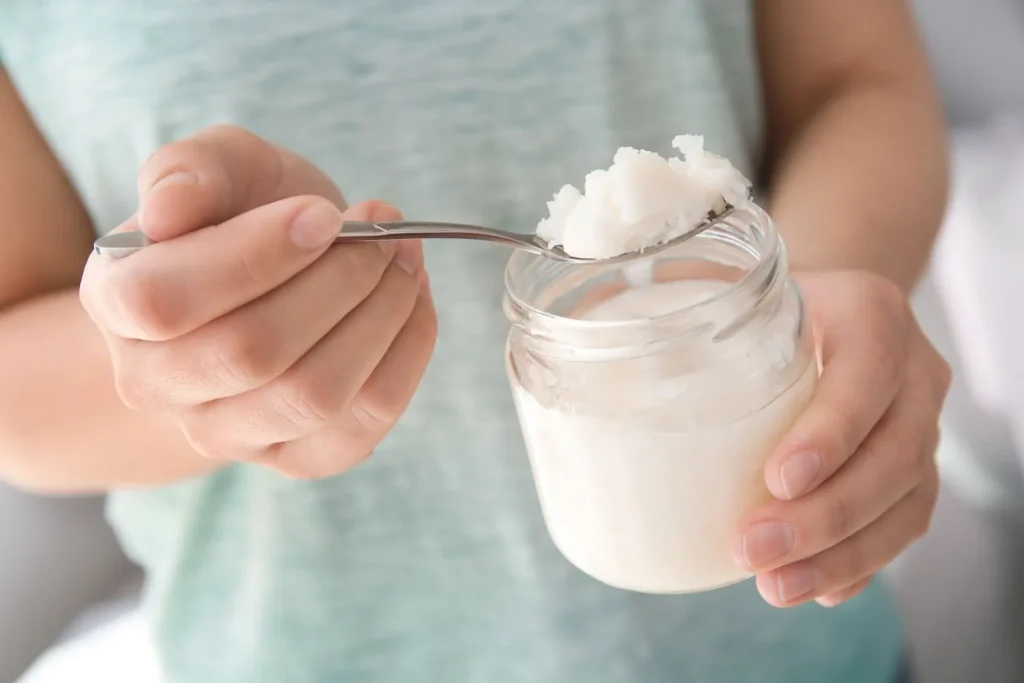Read time : 4 minutes

It’s on the lips of many people, “Coconut oil is the healthiest oil you can eat.” In Ghana, it’s even considered a cure-all by some. You’ll find it in kitchens, hair salons, skincare routines, and even in weight loss conversations. It’s a key flavor in dishes like red red (bean stew), tomato stews, and even kenkey accompaniments. But how much of this reputation is TRUE and backed by science?
Let’s break down what the research really says about coconut oil and whether it deserves its “miracle” label.
What Makes Coconut Oil So Popular?
Coconut oil’s popularity stems from both tradition and culture. In coastal regions of Ghana and other tropical countries, coconuts are abundant, making the oil affordable and widely used. Many older generations used coconut oil regularly and still lived long, active lives. Naturally, people assume it’s the oil that kept them healthy.
But here’s the truth: Our grandparents also ate fewer processed foods, were more physically active, and consumed less sugar. Today’s diets and lifestyles are very different, making it important to evaluate coconut oil with fresh, evidence-based eyes.
What Does the Research About Coconut Oil Say?
The Nutritional Profile of Coconut Oil
82% saturated fat – that’s much higher than butter (63%) or even palm oil (49%).
The problem? Saturated fats have been shown to raise LDL cholesterol (“bad” cholesterol), which can increase the risk of heart disease.
Scientific Evidence
A 2020 meta-analysis published in Circulation reviewed 16 controlled trials and concluded that coconut oil raises LDL cholesterol more than unsaturated vegetable oils like olive or soybean oil. This elevation in LDL is a major red flag for heart health.
But what about the medium-chain triglycerides (MCTs) you’ve heard about?
Coconut oil is compose of medium-chain fatty acids, fats that the body may metabolize faster for energy.
It includes capric (7%), lauric (49%), myristic (18%), palmitic (9%), stearic (2%), and has a small percentages of unsaturated fatty acids, including oleic (6%) and linoleic acids (2%) (Yong et al., 2009).
However, most studies showing MCT benefits used concentrated MCT oil—not regular coconut oil.
Studies claiming coconut oil helps with weight loss or metabolism have often been small, short-term, or conducted in animals, not large human trials.
American Heart Association (AHA) advises against using coconut oil as a heart-healthy fat, instead recommending oils rich in unsaturated fats.
The Journal of Clinical Lipidology confirms that replacing saturated fats (like coconut oil) with unsaturated fats improves heart health over time.
What Coconut Oil Might Help With
While coconut oil is not the miracle cure many believe, it does have some researched benefits, such as:
- May reduce appetite slightly (though the effect is small)
- Supports oral health when used as “oil pulling”
- Could help reduce seizures in specific medical conditions like epilepsy (under clinical supervision)
- But when it comes to heart health and cholesterol—the evidence just doesn’t support coconut oil as the healthiest choice.
The Bottom Line: Use in Moderation
Coconut oil can be part of your diet, especially if you love its flavor in traditional dishes. But it should be used in moderation, and it shouldn’t replace heart-healthy oils like:
- Groundnut oil (peanut oil)
- Soybean oil
- Canola oil
- Olive oil
Small amounts—like using a teaspoon in cooking or drizzling over salad for flavor—is fine. Just don’t deep fry or base your entire diet around it.
Practical Tips for All
Swap coconut oil with groundnut oil in stews for a healthier fat profile.
Combine cooking oils—using soybean oil for frying and reserving coconut oil for flavor accents.
Add more tomatoes, onions, and garden eggs to boost flavor in your meals naturally, reducing reliance on heavy oils.
Read labels on processed foods, as many snacks contain unhealthy oils like trans fats.
Final Thought: Coconut Oil Is Not a Miracle, But It’s Not the Enemy Either
In a nutshell, coconut oil isn’t the magical health booster it’s often claimed to be. It adds flavor and cultural value to meals, but it’s not your heart’s best friend when consumed in excess. Opt for unsaturated fats for heart health, and enjoy coconut oil occasionally—wisely and in small amounts.
Meet Your Ai Personal Trainer
👉Personalized workouts. Progress tracking. Real results.
MyHealthCop AI is your pocket trainer — always ready, always smart.
Download the App to Take your free Ai health assessment Today [Take Assessment]
RD, LD Julius Sammah
MyHealthCop Certified Dietician